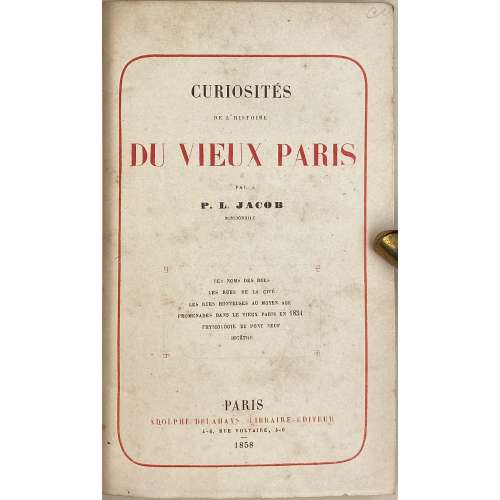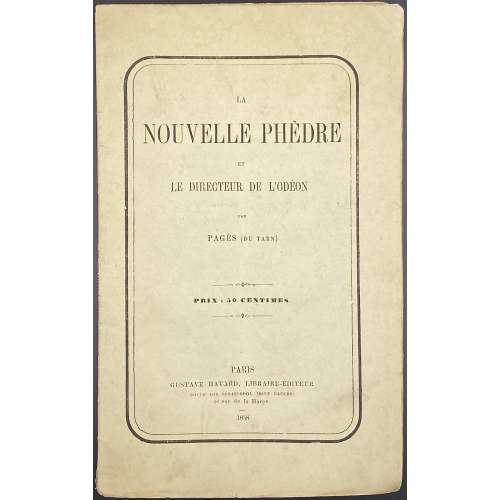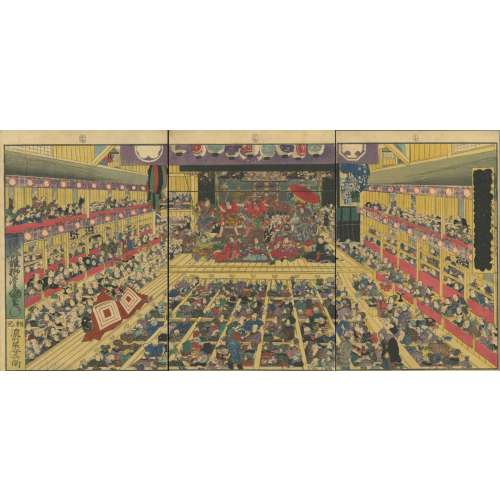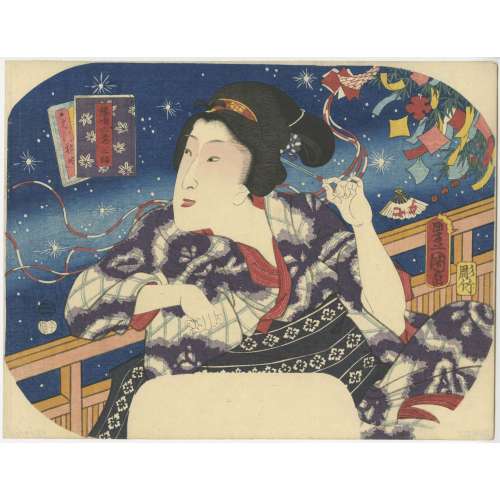-
 Title-page: CURIOSITÉS | DE L’HISTOIRE | DU VIEUX PARIS | PAR | P. L. JACOB | BIBLIOPHILE | { LES NOMS DES RUES | LES RUES DE CITÉ | LES RUES HONTEUSES AU MOYEN AGE. | PROMENADES DANS LE VIEUX PARIS EN 1834. | PHYSIOLOGIE DU PONT NEUF. | BICÊTRE } | PARIS | ADOLPHE DELAHAYS, LIBRAIRE-ÉDITEUR | 4-6, RUE VOLTAIRE, 4-6 | – | 1858 || Description: Hardcover, in-16o, 17 x 11 cm, quarter brown morocco over marbled boards, spine with raised bands, gilt lettering, gilt fleurons, marbled endpapers, original wrappers with red and black lettering within red frame bound in, some pages uncut. Collation: 8vo; π2 14, 2-238 244, total 186 leaves between original wrappers. Pagination: [4] [1] 2-364 [4], total 372 pages. Catalogue raisonné: Vicar: I, 770. Contributors: Printer: Simon Raçon et Comp. (Paris). Author: Paul Lacroix [P. L. Jacob] (French, 1806 – 1884). Publisher: Adolphe Delahays (French, mid-19th century).
Title-page: CURIOSITÉS | DE L’HISTOIRE | DU VIEUX PARIS | PAR | P. L. JACOB | BIBLIOPHILE | { LES NOMS DES RUES | LES RUES DE CITÉ | LES RUES HONTEUSES AU MOYEN AGE. | PROMENADES DANS LE VIEUX PARIS EN 1834. | PHYSIOLOGIE DU PONT NEUF. | BICÊTRE } | PARIS | ADOLPHE DELAHAYS, LIBRAIRE-ÉDITEUR | 4-6, RUE VOLTAIRE, 4-6 | – | 1858 || Description: Hardcover, in-16o, 17 x 11 cm, quarter brown morocco over marbled boards, spine with raised bands, gilt lettering, gilt fleurons, marbled endpapers, original wrappers with red and black lettering within red frame bound in, some pages uncut. Collation: 8vo; π2 14, 2-238 244, total 186 leaves between original wrappers. Pagination: [4] [1] 2-364 [4], total 372 pages. Catalogue raisonné: Vicar: I, 770. Contributors: Printer: Simon Raçon et Comp. (Paris). Author: Paul Lacroix [P. L. Jacob] (French, 1806 – 1884). Publisher: Adolphe Delahays (French, mid-19th century). -
 Cover: LA | NOUVELLE PHÈDRE | ET | LE DIRECTEUR DE L'ODEON | PAR | PAGES (DU TARN) | PRIX : 50 CENTIMES | PARIS | GUSTAVE HAVARD, LIBRAIRE–ÉDITEUR | BOULEVARD SÉBASTOPOL (RIVE GAUCHE) et rue de la Harpe. | 1858 || Pagination: [1-3] 4-48. Collation: 8vp; [1]-38 (total 24 leaves) Binding: publisher’s wrappers. Printer: Imprimerie Bonaventure et Ducessois (Paris); Ducessois, Théodore (French, 1804 – after 1864.) Bonaventure, Jules-Frédéric (French, ca. 1816 – 1891) Pagès (du Tarn) (French, fl. 1838 – 1872) – known absolutely nothing. Other works: La France, ode (M. Papailhiau, 1840); Aux Électeurs ... du Tarn (Soupe, 1848) ; Les Funérailles de Napoléon, ode (Pilout, 1840) ; Mazagran, 4, 5 et 6 février 1840, chant héroïque (M. Papailhiau, 1840) ; Herminie, ou l'Amour et l'honneur, tragédie en 5 actes, en vers (Moquet, 1872) ; Lettre à S.E. le ministre de l'Intérieur sur la nouvelle Phèdre et le Théâtre français (Moquet, 1856), etc. There is also a humorous book by Antony de Menou, which does not contain anything of substance: Un contemporain: biographie de Pagès (du Tarn). — Paris: Masgana, 1857. Antony de Menou is an obscure figure in his own right. An article about him can be found at Les derniers bohêmes by Firmin Maillard (1833 – 1901) [LIB-2652.2021].
Cover: LA | NOUVELLE PHÈDRE | ET | LE DIRECTEUR DE L'ODEON | PAR | PAGES (DU TARN) | PRIX : 50 CENTIMES | PARIS | GUSTAVE HAVARD, LIBRAIRE–ÉDITEUR | BOULEVARD SÉBASTOPOL (RIVE GAUCHE) et rue de la Harpe. | 1858 || Pagination: [1-3] 4-48. Collation: 8vp; [1]-38 (total 24 leaves) Binding: publisher’s wrappers. Printer: Imprimerie Bonaventure et Ducessois (Paris); Ducessois, Théodore (French, 1804 – after 1864.) Bonaventure, Jules-Frédéric (French, ca. 1816 – 1891) Pagès (du Tarn) (French, fl. 1838 – 1872) – known absolutely nothing. Other works: La France, ode (M. Papailhiau, 1840); Aux Électeurs ... du Tarn (Soupe, 1848) ; Les Funérailles de Napoléon, ode (Pilout, 1840) ; Mazagran, 4, 5 et 6 février 1840, chant héroïque (M. Papailhiau, 1840) ; Herminie, ou l'Amour et l'honneur, tragédie en 5 actes, en vers (Moquet, 1872) ; Lettre à S.E. le ministre de l'Intérieur sur la nouvelle Phèdre et le Théâtre français (Moquet, 1856), etc. There is also a humorous book by Antony de Menou, which does not contain anything of substance: Un contemporain: biographie de Pagès (du Tarn). — Paris: Masgana, 1857. Antony de Menou is an obscure figure in his own right. An article about him can be found at Les derniers bohêmes by Firmin Maillard (1833 – 1901) [LIB-2652.2021]. -
 Superb Edo pictures illustrating dances (Odori keiyô Edo-e no sakae): Interior of an imaginary theatre with a performance of Shibaraku 「踊形容江戸絵栄」. Artist: Utagawa Kunisada [歌川 国貞] a.k.a. Utagawa Toyokuni III [三代歌川豊国] (Japanese, 1786 – 1865). Publisher: Nōshūya Yasubei (Japanese, fl. c. 1851 – 1870). Year: 1858 (Ansei 5), 7th month. Size: Vertical ôban triptych; 36.9 x 75.7 cm. Signed: 一陽斎雛獅豊国筆(年玉印) – Ichiyôsai Hinashi Toyokuni ga (on the left sheet only). Censor's seal: Horse 7 [午七 彫師]. Subject: Shibaraku. Ref.: MFA impression: 11.44263a-c; Robert Schaap. Kunisada (2016), p. 101 [LIB-1212.2017]. Ref.: [LIB-1197.2016] Arendie and Henk Herwig. Heroes of the Kabuki stage: an introduction to Kabuki with retellings of famous plays, illustrated by woodblock prints. — Amsterdam: Hotei Publishing, 2004; p. 38. [LIB-3316.2024] Chris Uhlenbeck, Jim Dwinger, Josephine Smit. The Riddles of Ukiyo-e: Women and Men in Japanese Prints. — Brussels: Ludion, 2023, p. 218-9, № 107.
Superb Edo pictures illustrating dances (Odori keiyô Edo-e no sakae): Interior of an imaginary theatre with a performance of Shibaraku 「踊形容江戸絵栄」. Artist: Utagawa Kunisada [歌川 国貞] a.k.a. Utagawa Toyokuni III [三代歌川豊国] (Japanese, 1786 – 1865). Publisher: Nōshūya Yasubei (Japanese, fl. c. 1851 – 1870). Year: 1858 (Ansei 5), 7th month. Size: Vertical ôban triptych; 36.9 x 75.7 cm. Signed: 一陽斎雛獅豊国筆(年玉印) – Ichiyôsai Hinashi Toyokuni ga (on the left sheet only). Censor's seal: Horse 7 [午七 彫師]. Subject: Shibaraku. Ref.: MFA impression: 11.44263a-c; Robert Schaap. Kunisada (2016), p. 101 [LIB-1212.2017]. Ref.: [LIB-1197.2016] Arendie and Henk Herwig. Heroes of the Kabuki stage: an introduction to Kabuki with retellings of famous plays, illustrated by woodblock prints. — Amsterdam: Hotei Publishing, 2004; p. 38. [LIB-3316.2024] Chris Uhlenbeck, Jim Dwinger, Josephine Smit. The Riddles of Ukiyo-e: Women and Men in Japanese Prints. — Brussels: Ludion, 2023, p. 218-9, № 107. -
 Artist: Utagawa Kunisada [歌川 国貞], a.k.a. Utagawa Toyokuni III [三代 歌川 豊国] (Japanese, 1786 – 1865). Signed: Toyokuni ga [豊国 画] in a red toshidama cartouche Block carver: Yokokawa Takejirō [横川竹二郎] (Japanese, fl. 1845 – 1863), seal: 彫竹 – Hori Take. Publisher: Ibaya Senzaburō [伊場屋仙三郎] (Japanese, fl. c. 1845 – 1847). Combined date and kiwame seal: Ansei 5 (II-XII/1858). Size: Untrimmed fan print (uchiwa-e), 300 x 232 mm.
Artist: Utagawa Kunisada [歌川 国貞], a.k.a. Utagawa Toyokuni III [三代 歌川 豊国] (Japanese, 1786 – 1865). Signed: Toyokuni ga [豊国 画] in a red toshidama cartouche Block carver: Yokokawa Takejirō [横川竹二郎] (Japanese, fl. 1845 – 1863), seal: 彫竹 – Hori Take. Publisher: Ibaya Senzaburō [伊場屋仙三郎] (Japanese, fl. c. 1845 – 1847). Combined date and kiwame seal: Ansei 5 (II-XII/1858). Size: Untrimmed fan print (uchiwa-e), 300 x 232 mm.A young woman adjusting her hairpin on a balcony during the Tanabata festival, as inscribed on the white folding fan: [七夕] (Tanabata).
Inscription on the blue book (print title): Early autumn [はつ秋や] (hatsu akiya), inscription on the purple book (series title): Short love songs, second volume [端唄の意 二編] (Hauta no kokoro nihen). According to Marks (2010), Hauta no kokoro nihen series of fan prints was published by Ibaya in 1858 (p. 267|P6871).
The series refers to love songs of a certain type popular in late Edo. They were performed with the accompaniment of a shamisen, “Seven herbs of autumn, the song of the insects is not heard; the bodies of lightning bugs are burnt, and the precious writings of love are getting thinner like the song of the insects as I am waiting for you. So, on an early autumn evening, I spot the glitter of a lightning bug that lingered among the autumn grasses, and while listening to the pine cricket, I am singing with my heart troubled by love". [Tokyo National Museum; translation provided by Elena Varshavsky].Tanabata [たなばた] or [七夕] – meaning "Evening of the seventh", also known as the Star Festival [星祭] (Hoshi matsuri) – is a Japanese festival originating from the Chinese Qixi Festival. One popular Tanabata custom is to write one's wishes on a piece of paper and hang that piece of paper on a specially erected bamboo tree, in the hope that the wishes become true.


